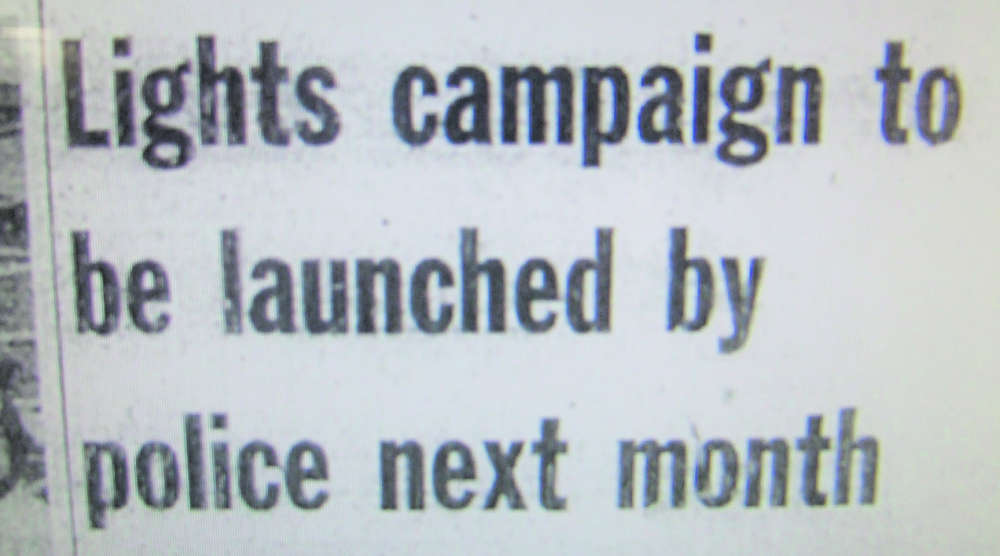
Local police were preparing for darker nights with a pre-winter campaign aimed at saving lives.
The headline (right) appeared over a Chronicle front page story in September 1976 calling on road users and pedestrians to see and be seen.
It warned anyone failing to comply was likely to be prosecuted.
A spokesman for Derbyshire Constabulary had told the newspaper: “Every road user has a double duty to ensure their own safety and the safety of others.”
Drivers were being told never to start a night-time journey without checking that every light was in working order and to be clearly seen.
All vehicles parked on roads or streets at night should be left facing the right direction and showing a light.
Cyclists were warned to ‘check their lighting equipment,’ replace batteries and bulbs if required and to regularly clean reflectors.
No one it seems was spared from the get tough police policy, even walkers taking an evening stroll.
The police press statement added: “Pedestrians should wear something bright and walk facing on-coming traffic where there is no pavement.”
Although prosecution was threatened, it was unlikely offenders would face the full force of the law.
A police spokesman, said: “We seek public co-operation in making the roads of Derbyshire safer, rather than issue fixed penalty tickets. After all, £6 is a lot of money.”
75 years ago...
A Glossop man was packing his bags and heading for East Africa for a medical job that included visiting hospitals to help in the training of nurses and lecturing.
Once Roald Starkie, 30, of Back Kershaw Street, got settled in the country he would be joined by his wife Edna and their three children.
Dancing and playing cards, although not at the same time, were massively popular at the time and the Chronicle was advertising the opening of the ‘grand’ whist drive and dance season at the Victoria Hall, Glossop.
Admission to the first one was two shillings and six pence which included dancing to the Regent Band, entertainment by the Mel-Bray Trio, refreshments and a chance to pick up £10 in prize money.
Still on entertainment and the Chronicle play critic admitted being sceptical when he saw Whitfield Amateur Dramatic Society’s production of Emlyn William’s ‘Tresspass’ as being unsuitable for anyone who was ‘easily upset’.
But after attending the opening night at the church school hall in Ashton Street, Glossop, he described it as a ‘real spine chiller’.
The ladies group at Mount Pleasant Congregational Church, Princess Street, Glossop, loved to end its fortnightly social evenings with a sing-song, but had no musical accompaniment.
But all that changed in late September 1950 when Mr and Mrs Ernest Jones of Simmondley presented them with a seven-stop American organ.
Parish councillors in Chisworth were claiming that the village was desperately short of homes and were asking the Ministry of Housing to give permission for the local authority to build some.
Councillors in neighbouring Charlesworth were also talking about shortages, but it wasn’t homes that were needed - it was facilities for young people.
The Junior Club at the Empire cinema on High Street West, Glossop, was just as the name suggests, somewhere children could get together to watch cartoons and adventure films on Saturday mornings.
Adults were not allowed, but to give parents a chance to to see the kind of films their sons and daughters were seeing and to get their views, they were invited in as part of a fact finding trial run.
People living in Woodhead and Crowden had to face a lengthy walk to and from Tintwistle to vote in county council and general elections, but that was to change.
Tintwistle Council was looking to provide a polling station nearer to them and had two possible locations up for discussion - the George and Dragon pub and Crowden Cricket Club’s pavilion.
The personal manager of the world famous orchestral conductor Sir John Barborolli made a surprising claim when he addressed a meeting of Glossop Music Club, stating music teachers should concentrate on ‘boogie-woogie’ and jazz to give students more choice.
It was a rainy day in Glossop when High Peak Labour Party held an open air festival in Manor Park when the guest of honour, the Minister of Food Maurice Webster, was scheduled to give an address.
The speech did take place and although the bad weather meant there were fewer people than expected, supporters sat soaking wet in rows of chairs to hear what the minister said.
Glossop Cooperative and Wholesale Society was the town’s main traders and there were at least 20 of their shops in Glossop, Hadfield, and the surrounding villages.
Headquarters were in the centre of Glossop on Norfolk Square and local councillors were giving planning permission for a new shop front.
There were huge celebrations in Tintwistle when the finishing touches were put to the last of the 64 houses to be built in the village since the end of the Second World War.




